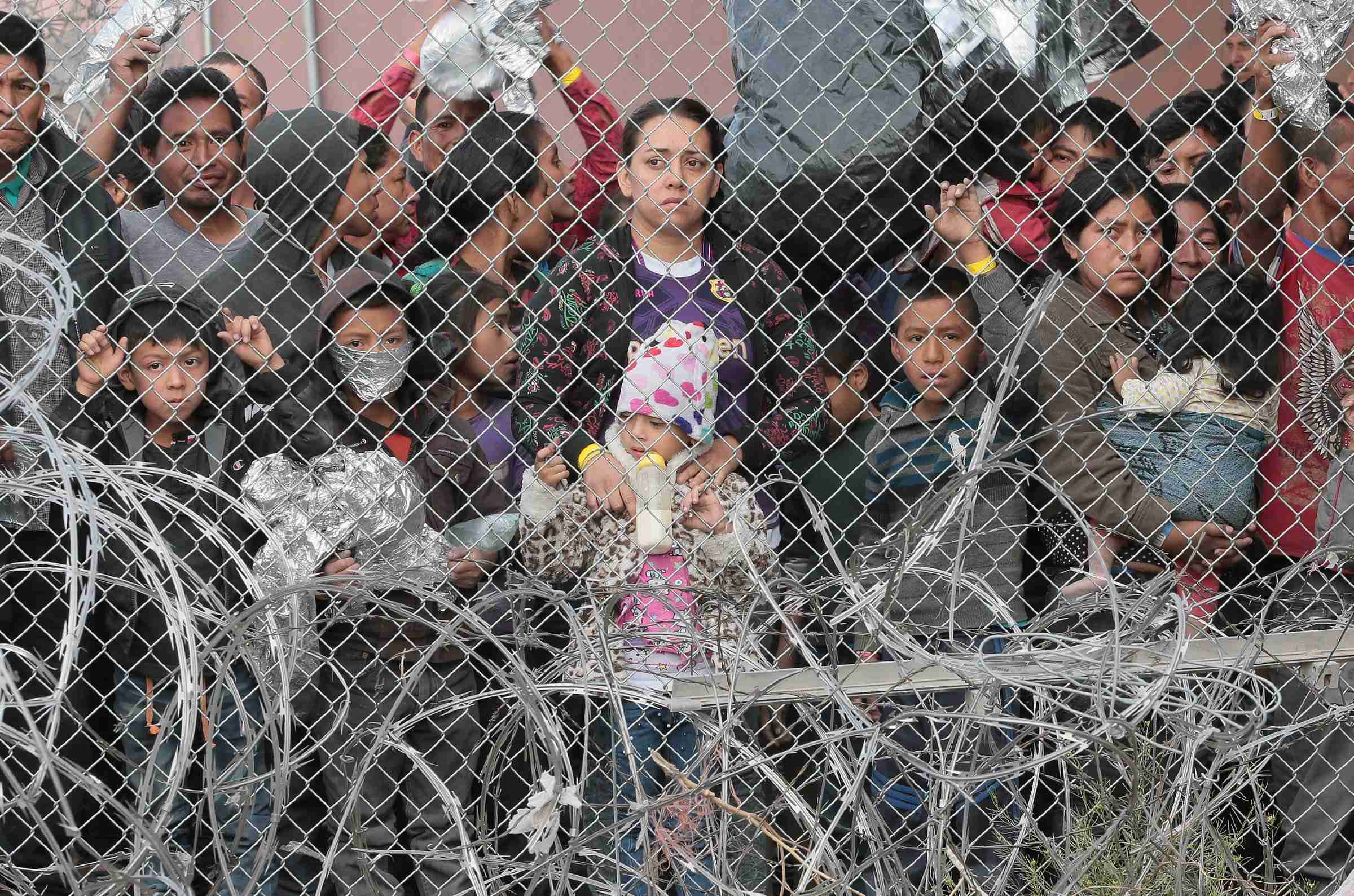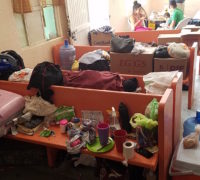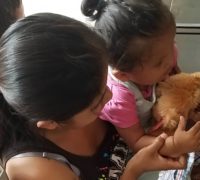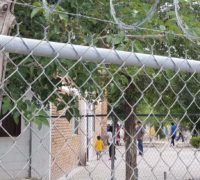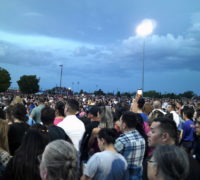Translate the Spanish word El Paso, and you learn it means “passageway to the north.”
For hundreds of thousands – if not millions – of migrants coming to the US southern border, El Paso, Texas in most cases is a fault line where the dreams of safety and employment clash with border guards, detention and deportation.
There is no glossing over the reality faced by migrants either crossing the US southern border at El Paso, Texas, or those awaiting entry in neighboring Juarez, Mexico.
What we must do is help, recognizing that what our generations learned from 1930s Europe feels all too familiar.
This is where JSurge and The Good People Fund come in. Early in August, Rabbi Steven Bayar, JSurge founder and director, and journalist Phil Jacobs, will bear witness to the hopes and desperation of migrants who seek nothing more than a small piece of the American dream. The two will be visiting the southern US border at El Paso as well as Juarez, its Mexican border city.
By the numbers, the US Border Patrol claims it has made 688,375 southwest border apprehensions since October of 2018. The number of migrants apprehended at the border has surged in May to its highest levels since 2006, with over 133,000 detained, including over 11,500 unaccompanied children.
The United Nations Missing Migrants Project reported that 170 migrants have died or are missing on the US and Mexico border so far this year. The Border Patrol has said that 283 migrants died in 2018, but human rights activists claim the number is higher.
Over the years, Holocaust scholars and teachers have talked about the urgency of looking at Holocaust victims and survivors as names, not by the numbers tattooed on their wrists. It is for this same reason that Rabbi Bayar will report on the human condition of the migrants as individual people, not just as government statistics.
JSurge, in close association with The Good People Fund, is sending funds to the area to bring mostly needed food and personal hygiene products to the migrants. The Good People Fund, which was founded in 2008, provides financial support and management guidance to small and mid-sized highly effective non-profit organizations. It helps its donors achieve a maximum of good by connecting them with a “good person” whose work best realizes their personal goals for tzedakah.
In El Paso, that good person is Dr. Eva M. Moya, associate professor at the University of Texas El Paso (UTEP) and president of the Association of Latina/Latino Social Work Educators. She has put a social magnifying glass on the issues homeless people experience in the community. Migrants, she told JSurge, are a substantial part of the homeless world she helps.
Dr. Moya will host Rabbi Bayar and Jacobs, introducing them to the migrant communities in both El Paso and Juarez. Monies sent to her from The Good People Fund will be used to purchase products for the migrants, many waiting for months, if not years, for an audience with an immigration judge to determine asylum or admittance into the US, or more likely deportation.
“Most individuals arrive here through a smuggler,” said Dr. Moya. “They seldom come here alone. They have been directed north in hopes of coming to the US. If they are fleeing violence in their home countries, they often apply for asylum.”
When migrants approach the US point of entry in El Paso, they must disclose to officials that they fear for their lives, according to Dr. Moya.
“You will be told to return to Mexico,” she said. “Go back to Mexico and wait for your turn. You have to go before a judge to see if you have a credible case (to enter the US).
“Most people are waiting in Mexico for days or weeks or months. For those who cross illegally, not at a point of entry and who have surrendered to the border patrol, they will be detained.”
Dr. Moya added that if the detainee is under the age of 18, he or she could be held by different agencies. Families, she said, will be separated in different facilities and they could wait for days, if not longer.
“This is a violation of their rights,” said Dr. Moya. “Some have been in detention centers for months and some for a year or more. When they are finally released, they are often left in downtown El Paso.”
Some 98 percent of migrants face deportation unless they have the funds to hire an attorney. Even with legal representation, the odds are against acceptance into the US.
And then the journey reverses from the streets of El Paso back to the migrant’s nation of origin.
Many of the migrants will find refuge at El Paso’s Annunciation House. The Annunciation House serves the poorest of the poor, many identified as undocumented immigrants. With this identification comes mostly poverty, injustice and oppression. Annunciation House will host its guests with short to mid-term needs.
The fact is, they dream of the US as their new home much like our Jewish ancestors saw New York and even Galveston, Texas as points of entry for new lives.
Dr. Moya uses donated funds to help purchase products needed by Annunciation House for its migrant guests, who come with almost nothing.
The Good People Fund, with contributions, including those from JSurge, is a strong believer in Dr. Moya’s mission and the work done by Annunciation House.
“On one particular day, the Annunciation House had 825 people dropped off there by the border patrol and by ICE,” said Naomi Eisenberger, co-Founder and Executive Director of The Good People Fund.
“There is a lot going on there,” she added. “It is very poignant. We were talking about what they needed. Eva was talking about kids’ underwear as a big issue, as well as personal hygiene products and even women’s leggings. Some of the girls and women are petit, and they have to wear ankle monitors, so the leggings are more comfortable.”
Dr. Moya prefers buying products from local El Paso merchants, who, the university professor said, were often immigrants themselves.
“It’s as direct as if they were buying products and handing them over to the immigrants themselves,” said Eisenberger. “Finding someone on the ground who we know and trust and becomes our agent is so important. And having more money to do this would be awesome.”
Eisenberger said her goal is to raise more than $10,000 to send to the border.
Donations can be made at goodpeoplefund.org or by mailing checks payable to The Good People Fund, 384 Wyoming Avenue, Millburn, NJ, 07041.
Rabbi Bayar perhaps said it best when asked why JSurge wanted to see the southern border and bear witness to the difficulties placed in the pathways of those seeking freedom in this country.
“We doing this because we are not hypocrites,” he said. “How many High Holiday sermons will stress how we must take care of the needy, feed the hungry and care for the sick? How many times does the sermon on Shabbat morning inform us that the Torah cares for those who are oppressed? How many times do we walk out of a service, Jewish or otherwise, comfortable with our ethics?
“Yet we allow our government to create conditions where children are abused and die. Don’t confuse the issues. We are not talking about immigration: legal or illegal – we are talking about basic human dignity and rights. For everyone who asserts that our government is racist and goes home to their families in safety, this is a wakeup call to what racism can lead to.
“I can no longer condemn the German people for their passivity during the Holocaust – for we are the German people of the 2000’s – and make no mistake – we will be condemned by generations to come for what we are allowing to occur.”


